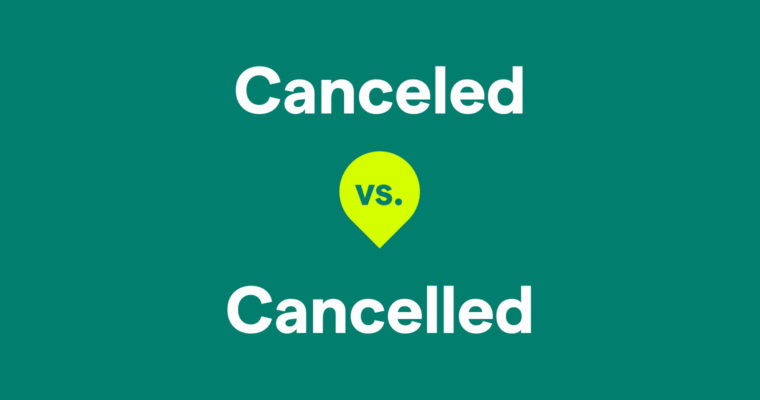
- Both canceled and cancelled are correct; the spelling depends on whether you’re using American or British English.
- The difference between canceled and cancelled comes from spelling conventions: American English simplifies by using one l, while British English retains the traditional double l.
- No matter where you’re from, the correct spelling of cancellation always includes two l’s, making it more consistent than the spelling of canceled or cancelled.
Whether it brings joy to students or disappointment to concertgoers, this word shows up everywhere—from school bulletins to event notices. Just look at these two examples:
So, which spelling is correct—canceled or cancelled? The answer depends on where you live. In this post, we’ll break down the difference between the two spellings, explain why both are technically correct, and show you when and where to use each one.
Table of contents
Why cancelled and canceled are different
Exception: Spelling of cancellation
Is it canceled or cancelled?
Canceled and cancelled are both correct—they’re simply different spellings of the past tense of the verb cancel. In American English, the preferred spelling is canceled (with one l), while cancelled (with two l’s) is standard in British English and other English dialects.
The same pattern applies to related forms like canceling/cancelling and canceler/canceller. However, with the noun form, cancellation (with two l’s) is by far the most commonly used spelling worldwide. While cancelation is technically acceptable, it’s rarely seen in either variety of English.
Why canceled and cancelled are different
The difference comes down to geography: canceled is the American English spelling, while cancelled is used in British English and other Commonwealth countries.
Now, let’s get into the nitty-gritty. Way back when, a man named Noah Webster (of Webster’s Dictionary fame) decided that some words could get along just fine without as many letters as our friends the Brits preferred. That’s why many American spellings look different from their British counterparts: think color/colour, honor/honour, and rumor/rumour.
For similar word-shortening reasons, Mr. Webster chose to simplify the past tense of cancel by dropping one l. This spelling first appeared in the 1828 edition of Webster’s Dictionary, although canceled didn’t fully replace the double-l version in American usage until around the 1980s. It’s not a hard-and-fast rule, but it’s the widely accepted form in American English today.
The spelling rule behind canceled vs. cancelled
So why is the l doubled in the first place—or not? It comes down to a general spelling rule: when a verb ends in a vowel followed by a consonant, and the final syllable is stressed, the consonant is usually doubled before adding a suffix (like -ed or -ing).
But cancel is stressed on the first syllable (CAN-cel), so American English doesn’t double the l. British English, however, tends to double the final consonant regardless of syllable stress—hence, cancelled.
When in doubt, remember that American English generally favors one l, while British English sticks with two.
Exception: Spelling of cancellation
Now that we’ve traveled (and not travelled, thanks to the same rule) through the spelling differences between British and American English, let’s look at the exception. Yes, there’s always an exception.
The word cancellation is consistently spelled with two l’s, no matter where you are. Here are some examples:
Think of it like this: When you turn the verb cancel into the past tense, the word stays the same number of syllables (two), so it’s a matter of location whether you use two l’s or one. The –ation that turns the word into a noun, on the other hand, adds two whole new syllables after the l. The double l acts like a bridge to those new syllables. At least, that’s one way to keep your l’s in line.
American examples of canceled
In American English, canceled (with one l) is the standard spelling, and you’ll see it in everything from newspapers to everyday conversation.
And here are a few extra-American examples:
British examples of cancelled
For any Briton, cancelled has two l’s—and always will.
So here’s the bottom line: If you’re writing for an American audience, stick with one l. If you’re writing for Brits—or using British English more broadly—double up. But when it comes to cancellation, just remember: two l’s, always.
Canceled vs. cancelled FAQs
What’s the correct spelling of canceled or cancelled?
Both spellings are correct—it just depends on where you’re writing. Canceled is the preferred spelling in American English, while cancelled is the standard in British English and most other English-speaking countries.
What’s the difference between canceled and cancelled?
The only difference is regional spelling. The words mean exactly the same thing and are pronounced the same way. American English tends to simplify double consonants, so it uses one l in canceled. British English tends to retain traditional spellings, using two l’s in cancelled.
Why does cancellation always have two l’s, even in American English?
Unlike canceled, the word cancellation has a different suffix: -ation. This adds two syllables, and the structure of the word justifies the double l. It’s the universally accepted spelling, regardless of region, because cancelation, though technically not incorrect, is extremely rare and generally avoided.
Is one spelling more correct or more formal than the other?
No—canceled and cancelled are equally correct within their respective dialects. Neither is more formal or more professional. The key is consistency: use one form throughout a document based on the version of English you’re using.
What about other forms, such as canceling vs. cancelling?
These follow the same pattern. American English uses canceling and canceler, while British English prefers cancelling and canceller. Just like with the past tense, the difference is purely stylistic and depends on regional spelling variations.






